#sympathetic villains
Text
Not Every Villain Needs To Be Sympathetic
Hero: "Why are you doing this?!"
Villain: "Well you see, when I was a child, my parents were killed before my eyes."
Hero: "Oh my. So... the trauma led you onto a path where you believed you were the hero of your own story?"
Villain: "Actually no. In fact, it made me embrace the fact I'm an unrepentant piece of shit."
Hero: "Wait, what? How?"
Villain: "I mentioned I was the one who killed them, right?"
Hero: "..."
Villain: "You really need to stop making assumptions about people, dude. Very condescending. Anyhow, if you could be a darling and just run into my knife a few times."
#writing advice#writerblr#writing#sympathetic villains#redemption arc#pure evil villain#villain#tragic backstory
58 notes
·
View notes
Text

#whoops it’s me#i’m people#comfort character#whump#hurt/comfort#tragic villains#villains#sympathetic villains#angst
419 notes
·
View notes
Text
Okay, so if you've been following me for a while and have seen my posts on the league of victim mentality—I mean villains, you may have gotten the idea that I hate “tragic” villains. This is not the case, believe it or not. I actually find villains with tragic pasts interesting. What I hate is when the “tragic” backstory is used to justify or overlook their crimes.
Warnings:
*LONG post
*Images
*Anti-Himiko Toga
*Anti-Dabi
*Anti-League of Villains
Spoiler Warnings for:
*Demon Slayer
*Bojack Horseman
*My Hero Academia
*Once Upon a Time (line or two)
*Wanda Vision (one line)
*HP (one line)
TRIGGER WARNINGS:
*Mentions murder, rape, and terrorism
Before reading, keep in mind this is an opinion piece and therefore may be a mistake or two. In other words, take it with a grain of salt.
So, to start this—basically what I said above. While my past posts suggest, otherwise I like villains with sympathetic backgrounds. The villains in Demon Slayer are among my favorites. They’re interesting as characters well as sympathetic. See, when written properly a sympathetic villain could be very entertaining. When written poorly, however, it comes off as them saying, “Look I know they’re responsible for killing a bunch of people, but you have to understand; they were sad once.”
Look, I am a person with a strong sense of justice and morals, and this tends to carry into the fiction I read. (Unless the tone prepares me, but that’s another post.) So when someone does something wrong, I expect the narrative to treat it as such. Now, of course, I’m not rigid, and I’ll have some flexibility on most things, even killing depending on the circumstances. However, I still want characters to be held to some accountability. I guess what I want is for writers to take the Bojack Horseman approach.
Whether or not Bojack is a villain is debatable, but what isn’t is that Bojack did many bad things and hurt a LOT of people. Now he has a sad backstory with abusive parents who abused him in every way but sexually. And the show never glosses over it. It states quite clearly that Bojack was hurt and uses his past to explain how he came to be the way he was so we can understand Bojack. It also makes it very clear that Bojack didn’t deserve the abuse he went through.
HOWEVER!
The creators of the show went out of their way to show and state multiple times that just because Bojack had a shitty attitude doesn’t mean it was okay for him to hurt the people he did. And more importantly, it shows that the people he hurt were people.
Princess Carolyn is a person whose feelings he took advantage of. Todd is a person who he used to make himself feel better and whose friendship he didn’t appreciate till later. Diane is a person who he hurt multiple times. Herb was a person who he betrayed and abandoned. Penny is a person he took advantage of and mentally damaged. Gina is a person he hurt and mentally scarred to the point she suffers from PTSD. Sarah Lynn was a person whose life was lost because of him.
These weren’t perfect people and, in their own way, they contributed to the situations that hurt them.Even so, in nearly all these cases they were victims of Bojack’s actions, and the show never denies or softens the blow. With Bojack, we see who he hurts, why he hurt them, and the results of his actions, most of which came from a choice HE made. Often in stories, these people would just be background filler for the villain to make them look evil, but here they’re people. Bojack Horseman also provides CONSEQUENCES for the title character. Again, Bojack hurt people and he’s held accountable. The League of Villains won’t be. Just watch. Hori has shown us in his other stories that he’ll let a villain walk after a beat down, and all will be forgiven.
“But wait, Looney! Bojack Horseman is a TV Show for adults. It’s targeted at a completely different demographic! Plus, it’s a different medium altogether. It’s absolutely not fair to compare the two.” Quite right. There is quite a difference. So, let’s look at something closer to the medium, shall we? Let’s look at another anime of the same genre targeted at the same demographic; Demon Slayer.
In Demon slayer, Demons are humans transformed by a demon named Muten. Once they become demons, they often lose control of themselves and their humanity and turn into beasts that eat demons.
I’m going to use the Spider Demon arc as an example, particularly the Spider Mother.
Now, here's why Demon Slayer works for me and BNHA doesn't;
First, we see the people that the spider demon hurts and how she hurts them;
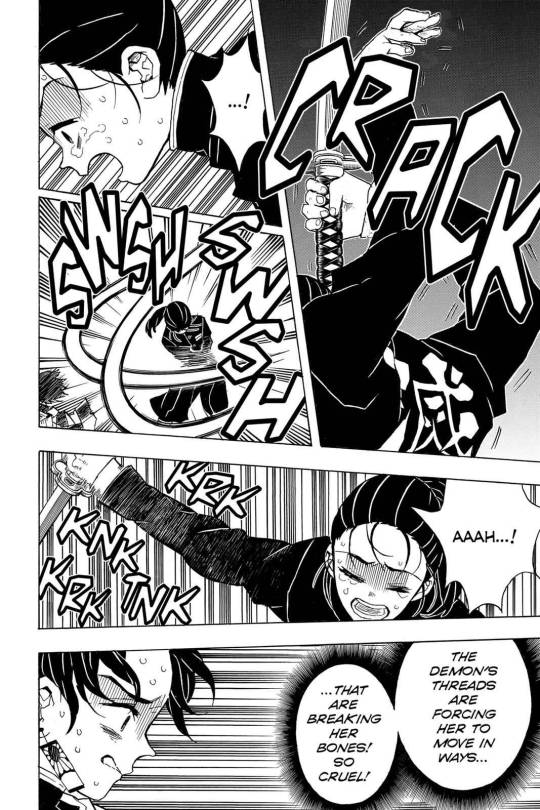
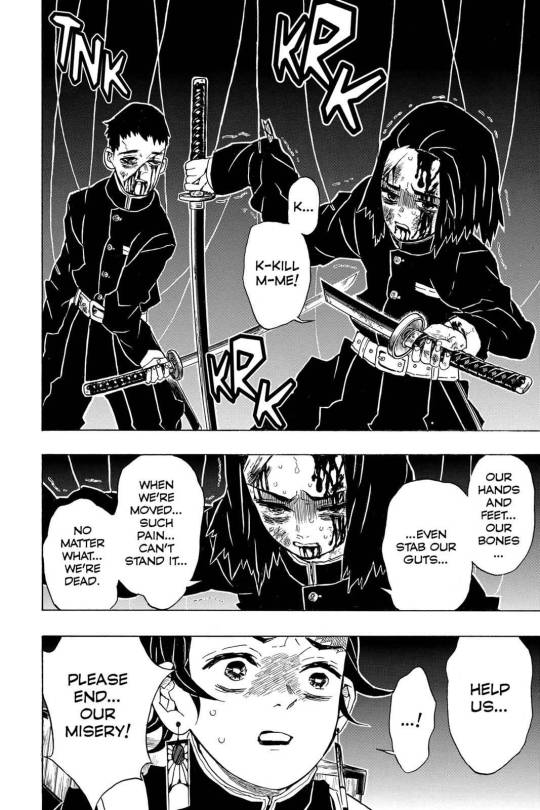
They’re not just waved off or mentioned in a line or two. We see these people frightened and hurt, begging for help before they are killed. Deaths we also get to see;
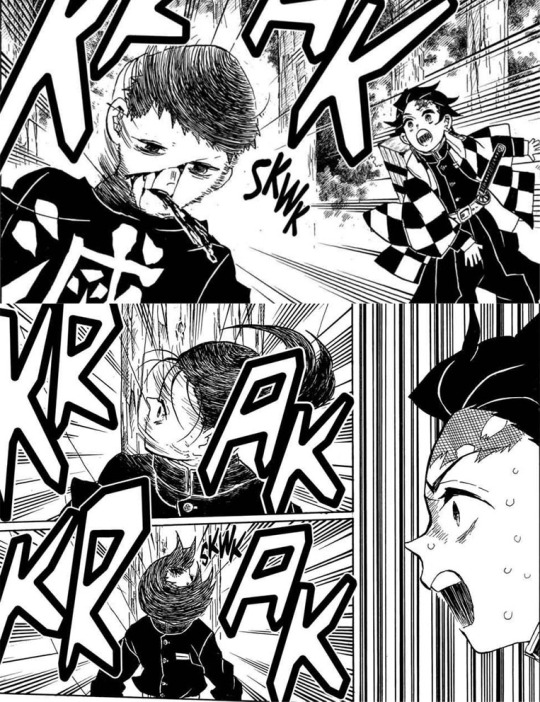
True, they weren’t main characters or even people Tanjiro and the others knew, but they were people.
Remind me, who did Dabe kill again? Can you think of any faces? Their voice? Do you know how they died? Did Dabi corner them? Or did he kill them in a burst of hellfire? Were they even aware they were going to die or surprised? We don’t know any of that. The only hint we got that Dabe’s actions hurt anyone was a reporter, but that’s it. The manga doesn’t want to focus on the people that were hurt because they want Dabe to remain sympathetic. Ultimately, his victims mean nothing.
And yet, Demon Slayer did better in making the villain sympathetic;
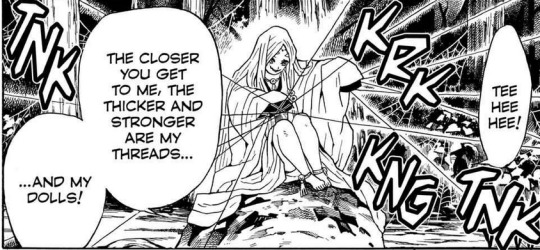
The Spider Demon Mother was once a human turned demon who joined Rui for protection. She was then forced to change her face and become a “mother” despite being younger than the rest.
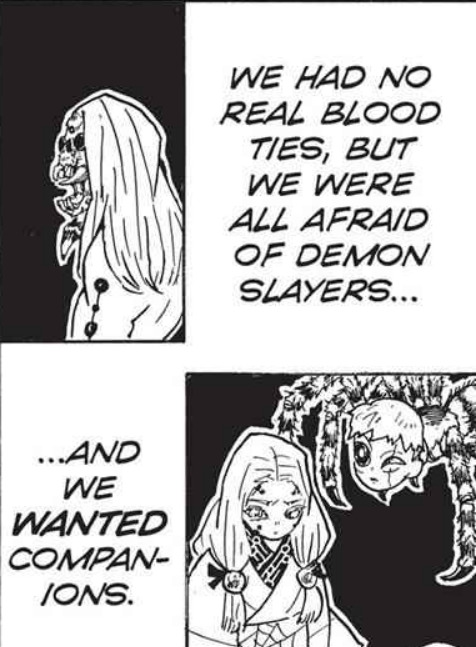
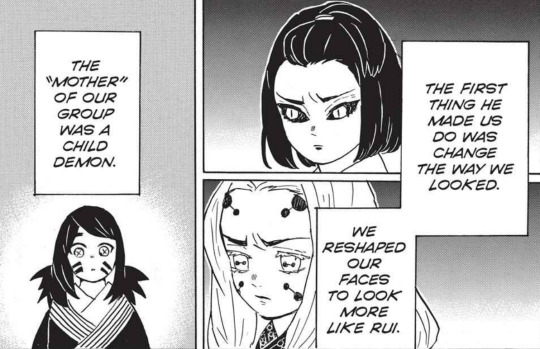
We see that she was abused, hurt, and scared--
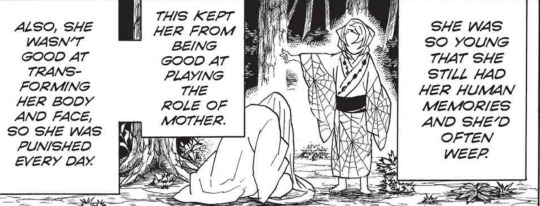
--So much that she longed for death.
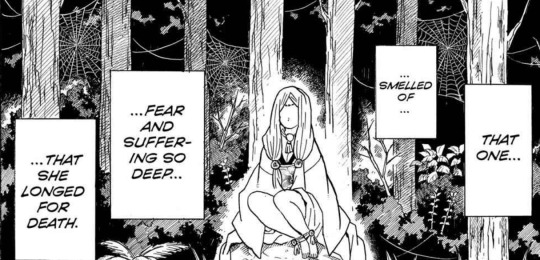
So much so that we pitied her along with Tanjiro.

However, we knew she had to die to atone for the people she killed. There’s no cushion to her crimes; we saw her torture and kill teenagers who were just as terrified as she was. And also know that because she was a demon she had killed and eaten innocent humans regularly.
Shinobu put it best herself when facing Spider Sister; "Bitch you killed a bunch of people and expect that to be okay?"
Okay, she didn’t say that. Here’s what she actually said;
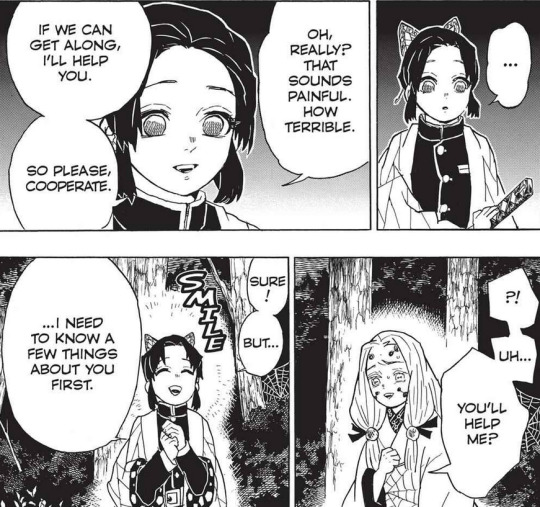

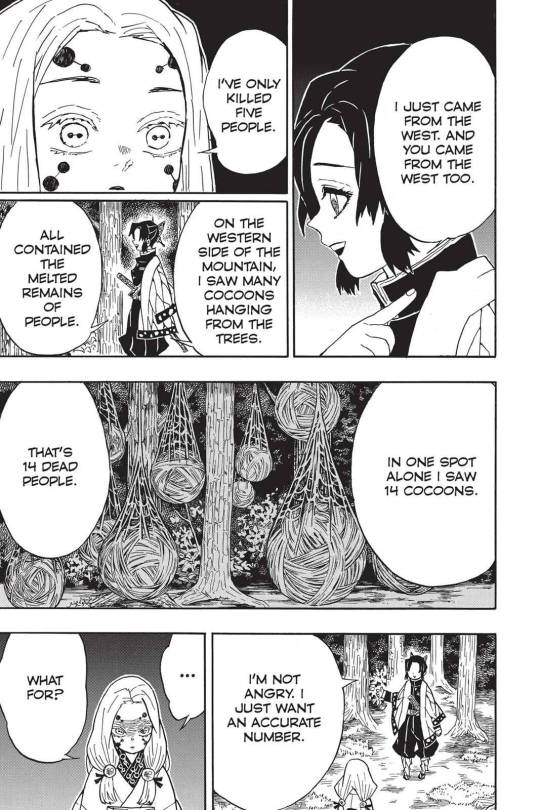

Shinobu is pretty merciless here to this demon begging for help but it’s not unwarranted. Like it or not, she has a point;
The spider demon here killed many people over the years quite mercilessly. Nature or not, she still did it, and even if Shinobu did show mercy, there’s no evidence that the demon girl wouldn’t just eat more people when she was safe.
However, there’s the fact that the demon here really can’t help it. She was turned into a demon against her will, and her mind is clouded by demon instincts. It’s like getting mad at a cat for killing a bird. It’s sad, but it's nature.
The compromise comes from our hero. Tanjiro knows that he has to kill the demons because they’ve hurt people and will continue to hurt others. However, he still remembers that these demons are people too. So when he kills them, Tanjiro isn’t cruel, or merciless.
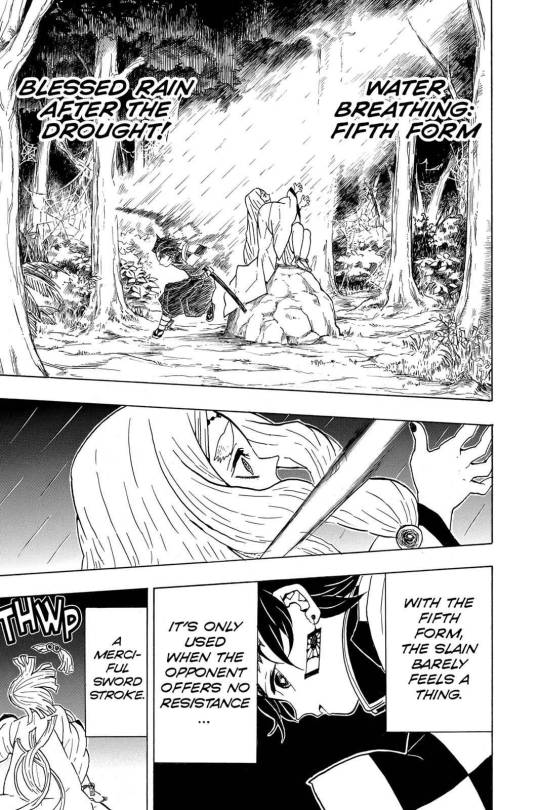

Tanjiro made her death as swift and painless as possible. He took no joy in it it, but did what he had to do. Because she wouldn’t stop and those kids that were killed right in front of him deserved justice. The Spider Demons were were victims but they were also killers. THAT’S why they were villains. And so, Tanjiro and Shinobu held them accountable.
Speaking of which--and lacking a better transition--One of the things I love about Tanjiro is that he never allows the villains to use the victim mentality on him. One actually tries it once;
During the sword village arc, they accuse Tanjiro of bullying the meek when said meek is a fiendish killer who spent both his human and demon life blaming his failures on others.
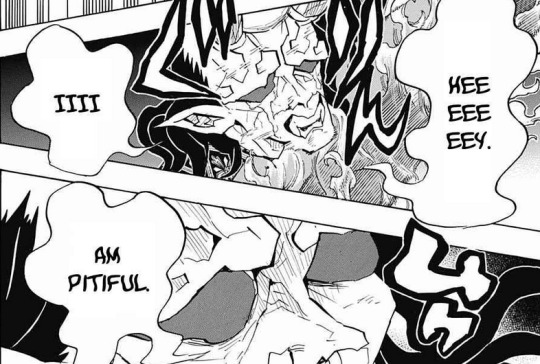
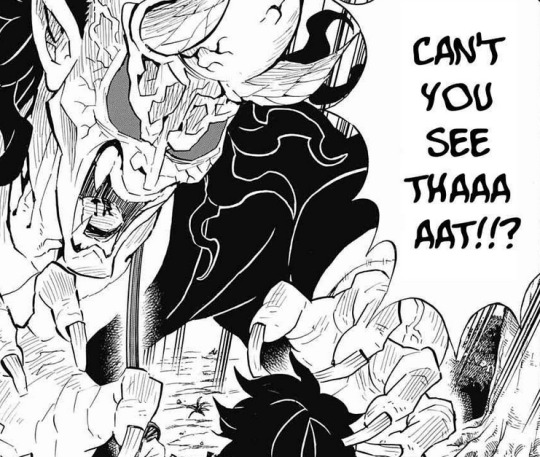

(Picture says it all, doesn’t it?)
How does Tanjiro respond? He calls them the fuck out.



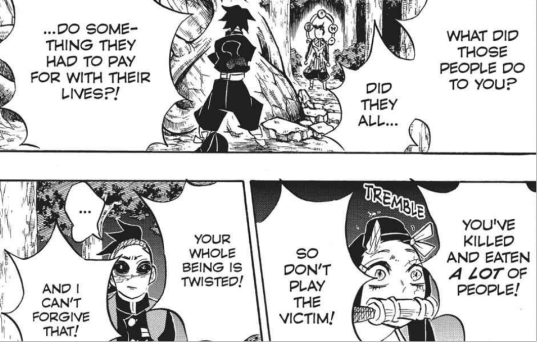
He all but states they’re not victims but attackers. They’re the ones killing innocent people without care and refusing to take responsibility.
Tago reminds me of the meek demon. She is responsible for killing thirteen boys and several thousand people when Shiggy destroyed a city. Yet all she’s thinking about is herself.
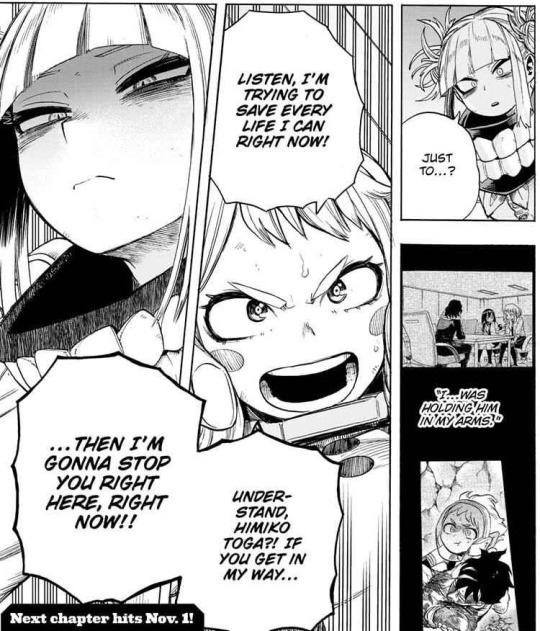
During her entire fight with Ochako Tago is thinking of ONE person; herself. Even though thousands are dead and dying because of her. But oh, Ochako’s at fault here for not listening, boohoo! Fuck off. And before you say it, the fact that she’s a teenager only gives her so much leeway.
Ochako calls her out for this and tells her the same thing Tanjiro did.

Unlike Tanjiro, Ochako is treated like she was in the wrong, and it becomes all about poor Tago, who by the way, killed an old lady just to trick her.

See, the difference? Demon Slayer makes its villains sympathetic and accountable, My Hero Academia—like a lot of shows—doesn’t. From here on out Ochako is treated like she did wrong for not “listening” to Tago. (I’m gonna have to make a vent post about this chapter eventually.) But for now, I digress.
And while I tend to give Hori a lot of leeway in BNHA, as I know that the story is heavily influenced by editors and publishers, I know this on him. Why? Because he did it in his other story.
I’m going to use the Aquarium arc as an example. Here, whale man abused the animals whom he gave human form and even killed them.

Yet in the end, it’s hinted that he’s going to be welcomed back and given another chance.
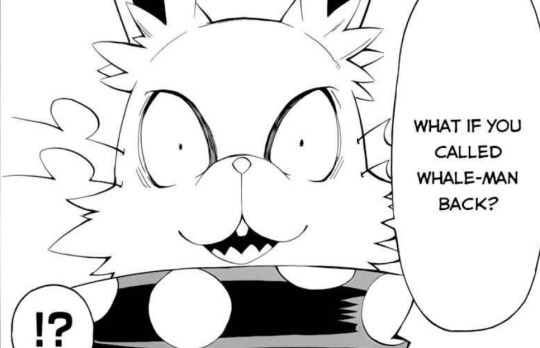
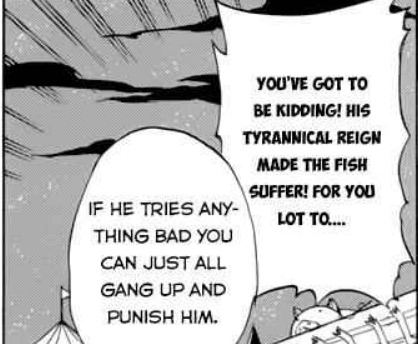
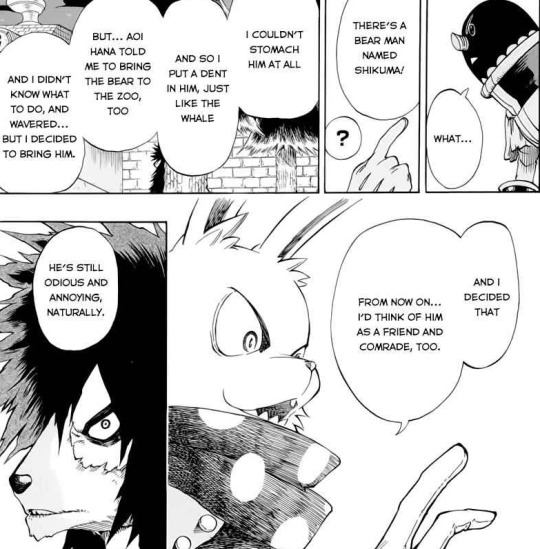
But here’s a surprise; Hori could get away with that shit here because most of the main characters are animals. Cruel, but killing is different in the animal kingdom because—as sad as it is to say—there’s a law of survival of the fittest. The animal mentality is different from a human's in a blue and orange way.
In BNHA the people being killed and doing the killing are human. There’s no blue and orange, it’s black and white. Hori can try to say it’s gray all he likes but it's not. He says the heroes are just as bad as the villains but when have we ever seen that? Have we ever seen a hero hurt an innocent? Refuse to save a person? Demand they be paid before doing their job? Nope.
The worst we see is Endeavor as an abusive father, and that’s a different can of worms.
So, in conclusion;
Sympathetic villains are great when done right. It makes them engaging and can create empathy for others while showing a different POV.
However, most writers refuse to hold them accountable, which can be even more dangerous than creating a villain like Maleficent or even All for One. Why? Because then the audience will use it to justify their own shitty behavior, a fear the creators of Bojack had, especially after an incident with the Rick and Morty fandom and the Mulan sauce.
The show runners of Bojack even had a character in their show flat out state,
“You know that’s not the point of the [show]--for guys to watch it and feel okay.”
“I don’t want you, or anyone else, justifying their shitty behavior because of the show.”
--Diane, Bojack Horseman, Head in the Clouds
And personally, I hate the victim mentality more than anything, especially when the characters exhibiting it have done some truly awful things.
OUAT Regina: "You’re the one who added evil to my name!"
Me: Uh, yeah! After you spent years murdering, raping, and slaughtering villages, then cast a spell that kidnapped hundreds of people and mind raped them. All because your mother—who you KNEW was a manipulative bitch—tricked an eight-year-old into telling a secret!
OUAT Rumpelstiltskin: "Why can’t I have a happy ending?" (Paraphrasing)
Me: Because you caused nearly everything that went wrong in the show and emotionally manipulative and abusive, controlling bastard.
OUAT Zelena: "Sister, why can’t we be BFFs?" (Paraphrasing)
Me: Many reasons, but the biggie is that you raped her boyfriend and eventually got him killed.
OUAT Mary-Margret and David: "Oh, our daughter hates us because we lied."
Me: Uh, there's also the fact you kidnapped an unborn baby from her mother. Then filled her with "darkness" that made it so every choice she made would result badly for her, then sent her to another dimension to die. Oh, and you did that just so you could manipulate your daughter's future instead of letting her have free will! (And how did that work out, btw? Oh, right. She became a thief and went to jail, all “without” darkness in her.)
(Note: Please don't misunderstand, the OUAT actors did a great job, but the writing failed the characters.)
WandaVision Monica to Wanda: “They’ll never know what you gave up.”
Me: Oh poor baby, Wanda had to give up a fantasy family that she literally made up and could create literally anywhere else to set a town free that she mentally enslaved to play out her TV fantasies. Something she knew she did because the government told her so when they came to save them! Wanda mentally tortured a town of innocent people for a year just so she could have her fantasy family life. And no! Her past doesn’t make shit like that okay.
HP Snape: "Why didn’t Lily love me?"
Me: Because you never viewed her as a person but as your dream girl. Also, Lily knew that you looked down on anyone with muggle blood to the point you joined the magical Koopa Klan. (You all know what I mean.) And Lily told you that to your face!
Do you see my point? I could come up with more examples but this post is long enough. The sad backstories of villains are supposed to help the audience understand so we can prevent ourselves and others from ending up like them. They are NOT supposed to be an excuse for their actions or a justification to wipe the slate clean. But that’s what most writers tend to do nowadays, which is why I prefer my evil for the luz villains. They’re fun, entertaining, and interesting, and they don’t waste time making excuses.
Does this mean I want the BNHA villains to die? No. I mean, I won’t cry or anything, but I’ll call it even if they go to jail for a couple of years and spend their lives repenting afterward.
And you know what? I can live with it when fans do stuff like this because that’s what fandoms do. It’s a whole different story when the creators do it as they should know better.
It’s like when a kid says, “fuck you” and when an adult says it. Sure, it’s insulting and infuriating but it's just kids being kids, so you blow it off. If an adult does it, that’s a whole different story as they know the meaning and ramifications of that word.
Anyway, this is long enough, so I’ll end this here.
#Ugh#going to get the bnha images was hard#that chapter made me so mad#but hopefully I explained myself well#demon slayer#demon slayer meta#tanjiro kamado#spider demon#Bojack Horseman#bnha#mha#bnha meta#anti himiko toga#anti league of villains#anti dabi#anti regina mills#anti rumpelstiltskin#anti zelena#accountability#sympathetic villains#victim mentality#anti victim mentality#vent#vent post#take with a grain of salt
63 notes
·
View notes
Link
“Everyone loves a good villain. One who cackles at the sky and shakes their fist and brings some form of doom to something or someone. It is fun to have someone to root against and root for — especially if they have a fun, cosplay-worthy aesthetic. With all that goes into stanning our favorite villains of all time, there is something to be said about examining the superficiality of villainy.
Like many character types, villains have often been visually identifiable. They have some costume or way of moving or physical features that mark them as villains in the story. Villains look bad or evil. Villains just look like villains. This is where some of the problems start with who we assign villainy to in storytelling. A hero versus villain narrative is often an Us versus Them set up, with Us being on the side of the hero and Them being on the side of the villain.
I recognize that sympathetic villains have recently been on the rise. I, for one, have also argued there are more generous ways of interpreting villains from our literary past. Nevertheless, when we look at the big picture of villains, they are often the othered members of society who are wrong or bad or shunned.“
#THE SUPERFICIALITY OF VILLAINY#villain#book villains#hero versus villain#bad versus good#good and evil#sympathetic villains#book blog#book essay#medieval#early modern#VILLAINS AND ABLEISM#ANTISEMITISM AND THE VILLAIN#THE QUEER-CODED VILLAIN#RETHINKING WHAT OUR HEROES AND VILLAINS LOOK LIKE#we support women's wrongs#The Jasmine Throne by Tasha Suri#Iron Widow by Xiran Jay Zhao#Hench by Natalie Zina Walschots#That Time I Got Drunk and Saved A Demon by Kimberly Lemming#sensitivity readers#Who do we want our villains to be?
30 notes
·
View notes
Text
Good & Evil - Sympathetic Villains

Welcome to Good & Evil: A Study of Heroes & Villains. I’m discussing different forms of heroic and villainous characters, different types of protagonists and antagonists, and providing examples of them each from various sources. Last time, I talked about Flawed Heroes: ultimately heroic protagonists who don’t necessarily always do the right thing at the right time. So it seems appropriate I follow it up with what would arguably be their antagonistic mirror images: Sympathetic Villains.
When I talked about Villains (“With a Capital V”) I mentioned that I would be sparing Sympathetic Villains for a separate category, and that is this one. While straightforward Villains are essentially evil characters usually for the sake of being evil, with little to no redeeming values, Sympathetic Villans are villainous antagonists with a deeper twist. While some Villains have an empathetic side, Sympathetic Villains are characters we not only can understand, but at times even feel sorry for. They are evil people with a good side to them; not rotten to the core, but not in the right with what they do either. Even though they aren’t all bad, we recognize that the extreme measures they go to in order to get whatever they want make them ultimately the villain of the story, and while we might pity them or even, on some level, agree with their reasoning, we understand they are taking the wrong route to wherever they want to go.
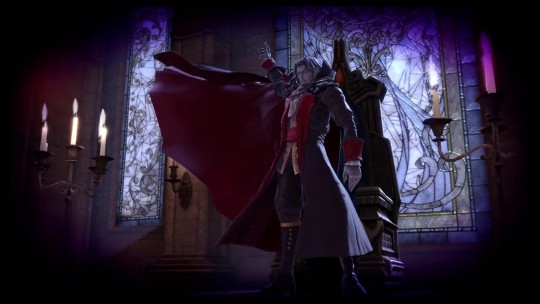
When I think of Sympathetic Villains, one of the first characters I think of is Count Dracula. Now, Dracula in the original Bram Stoker book - and many earlier interpretations - is NOT a sympathetic villain. He is really a straightforward bad guy with little to no great pathos. However, starting in the 1970s and lasting well into the modern day, Dracula has been reinterpreted frequently as a more tragic figure. Probably my favorite sympathetic version of Dracula is the one in the Castlevania franchise: in the Classic games, just like in general, Dracula started off as a simple Villain, but as time went on and the lore of the series evolved, the character became more layered and complicated. He developed legitimate reasons to hate mankind, and had a son he truly cared about and loved. While his actions could be repugnant, and the threat he posed was real, it became hard, therefore, to truly loathe him. This carried over into the animated series (as well as into the “Lords of Shadow” reboot, where the character was turned into more of an anti-hero than a true villain): the Count’s mixture of personal isolation and tragic losses in life, in all these versions, make him just as much a figure of sorrow as sinister villainy.

Comic books have many sympathetic scoundrels. Much like Dracula, the Batman villain Mr. Freeze didn’t start off especially sympathetic, but as time went on, more and more layers and tragic elements were added to the character. Even from the beginning, the character was something of an outcast: his “power” was really a handicap, preventing him from existing properly in the normal world. He could no longer experience simple pleasures that most people take for granted, as his need to remain in sub-zero temperatures hindered him greatly. This was later compounded with the addition of making Freeze a lovelorn swain, as he was revealed to have a wife - named Nora - suffering from a terminal illness. In some versions, it is Freeze’s desire to save Nora that leads to his evil scheming, while in others, the loss of Nora drives Freeze totally over the deep end. In many cases, it’s a mixture of both. Regardless, the tragedy of Nora and Mr. Freeze has become so integral to the character, many people forget that it is a relatively recent addition to the villain’s established background. The idea of isolation and lost love brewed together makes Freeze one of the most lonely and depressing villains in the DC canon, and many consider him one of the saddest antagonists in comic book history.
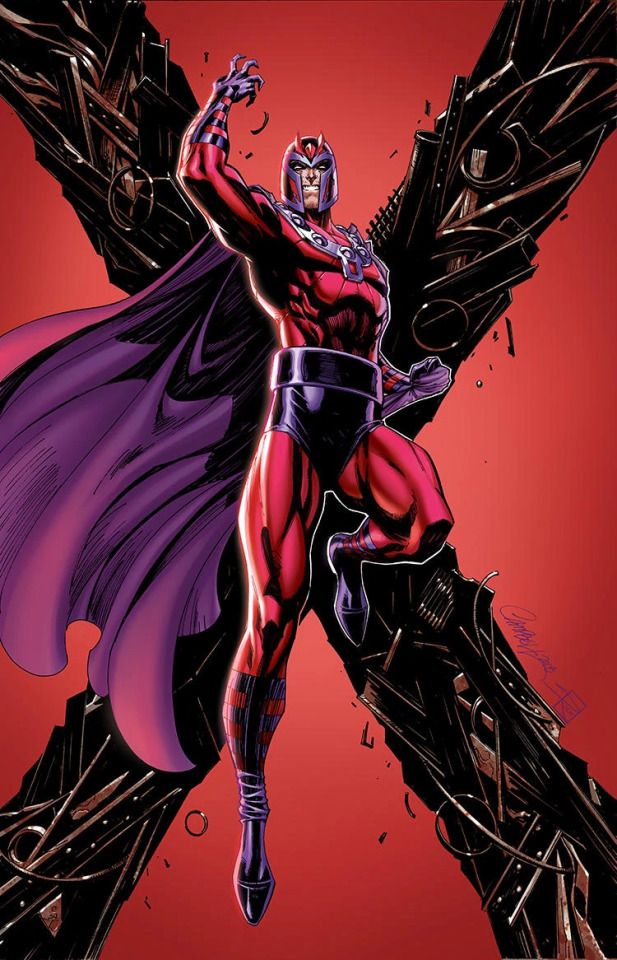
Marvel has their fair share of villains too, and one of the most iconic of this sort is Magneto. Magneto is what you might call a “noble villain,” which I personally consider a sub-category for the Sympathetic Villain archetype. While one rarely feels SORRY for Magneto, one can understand his agenda and why he is the way he is. Magneto believes that the human race is a barbarous and base species, while Mutants like himself are the superior species. All of his plans revolve around conquering, eradicating, or “evolving” the human race, putting Mutants in charge of everything. Given Magneto’s past, you can hardly blame him for his bitterness towards mankind: he’s not only a Mutant, meaning he frequently faces prejudice just on that front alone, but he’s also a Holocaust survivor. He has seen how depraved mankind can be, and he has had little shown to him to convince him humanity can be saved. Ironically, his “Mutants Over All” ideal can be seen as him coming full circle, in some ways. While his actions can be cruel and vicious, we understand where he’s coming from, and he’s not a villain without standards: most exemplary is his relationship with Professor X, who is both his arch-nemesis and his best friend at the same time.
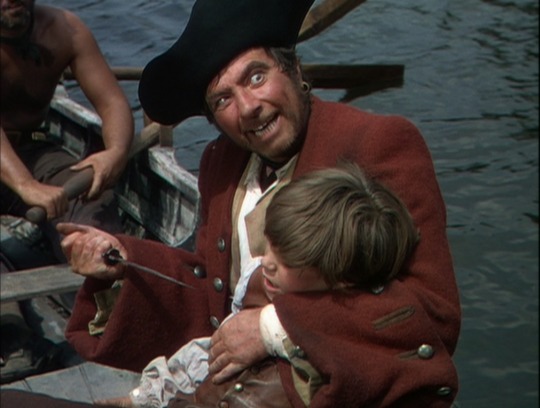
Speaking of friendships between heroes and villains, sometimes a Sympathetic Villain doesn’t have to have a tragic backstory or deep, compelling motivation and goal to BE Sympathetic. Ultimately, they simply have to show us that they have a good side to them, somewhere deep down. A common way of managing this is having the Villain show they legitimately care about someone, and making that element a focal point for their character. One of the most classical examples of this is Long John Silver, the main antagonist of Robert Louis Stevenson’s “Treasure Island.” Silver is a villain, plain and simple: he is a treacherous and manipulative crook who has no compunctions killing and threatening innocent lives to get what he wants. What he wants is not an especially sympathetic goal, either: he obsesses over finding Captain Flint’s long lost treasure, and not for any particularly noble reason, just because…well…he’s a pirate, and that’s a lot of money to be had. The primary thing that makes Silver a sympathetic and interesting character is his relationship with the hero of the story, Jim Hawkins: in the book, Long John comes to care about Jim, developing a sort of fatherly or big-brother-like relationship with the young Cabin Boy. He’s protective of young Hawkins, and while he threatens Jim and his friends a few times, and has no problem killing the others on the ship, he is totally sincere when it comes to making Jim stays safe and alive. It’s the mixture of his rascally nature and his genuine care for the boy that makes Silver not only an intriguing antagonist, but also an unpredictable rogue. You’re not always sure if he’s going to do something good or bad, probably because he’s not always sure, himself. It’s telling that, much like Dracula, there are several takes on the character that make him even more sympathetic than he already is in the story, turning him into a more anti-heroic figure.

Finally, some villains can be sympathetic by just…well…being people, so to speak. I can think of no better example of this than Pokemon’s infamous Team Rocket Trio: Jessie, James, and Meowth. Much like Silver, these three have no noble-but-somehow-twisted goals or complex, poignant motivations for what they do, but they are characters we come to like, regardless. Not only are the three funny villains, with a great deal of humor to them, but over the years, we’ve come to see other sides to Team Rocket besides their evil deeds. We’ve seen them work with the heroes to stop bigger threats, or even secretly play the good guys behind the scenes by bringing a different perspective the heroes never consider. We’ve looked into their backgrounds, and seen how they became the thieving rogues they are, we’ve seen them form relationships with other people and Pokemon alike, and we’ve seen them move in-and-out from being treated as serious, dangerous criminals and more just annoying nuisances. Their many rises and falls, their comedic capabilities, and their very relatable qualities when they AREN’T concocting diabolical schemes endear these characters to us greatly. They aren’t sympathetic because we feel sorry for them, but they feel…human.
“Human.” That is the word for a Sympathetic Villain. There seems to be a growing belief that villains HAVE to be sympathetic, in some way, in order to be interesting; this is completely untrue, of course, but I think it’s telling that, as time has gone on, we’ve come to demand more humanity from our villains. These types of antagonists serve a double-purpose in storytelling. They teach us, first of all, that evil is rarely born, but usually created. They show audiences that, underneath every wicked smile and cackling laugh, there might be someone crying deep inside their heart. They prove that even the rottenest egg in the bunch can have a good spot deep in their center. They help us recognize that evil people are still people, just like us. However, Sympathetic Villains also serve effectively as cautionary tales. All of them are recognizably human and understandable, perhaps even people we want to help on some level…but, importantly, they help us recognize that - no matter how justified they may be in their anger, pain, or sorrow - they are still in the wrong. They teach us that we must be careful how we manage our emotions and beliefs, lest we take the same path into darkness they have.
In short, Sympathetic Villains are characters who force us to ask a tough but simple question, every time we see them: if we were in that situation…what would we do? Would we give in to the madness, or would we fight it at all costs? This, above all, is what makes them so compelling.

#good and evil#a study in heroes and villains#sympathetic villains#analysis#character types#archetypes#gollum#lord of the rings#erik#phantom of the opera#mr. freeze#batman#dc#magneto#x-men#marvel#count dracula#dracula#castlevania#team rocket#pokemon#long john silver#treasure island
45 notes
·
View notes
Text
"I have a mother too."
I think about this Oswald moment a lot. His response to the woman's plea is done with such a sad delivery. It makes me wonder if he feels bad for this murder, relating to her children.
He is capable of feeling for other people, even if he is more selective with it than your average Joe. He could just be sad about Galavan kidnapping his mother for leverage idk.

Gif by @theiceberglounge
#gotham#tv#oswald cobblepot#the penguin#dc#lgbtq+#canon queer characters#canon disabled character#character analysis#character appreciation#media commentary#episode commentary#scene analysis#acting#be gay do crimes#gotham season 2#theo galavan#alphabet mafia#rogues gallery#sympathetic villains#robin lord taylor#gertrud kapelput#family dynamics#gifs
23 notes
·
View notes
Text
It's so stupidly fucking annoying when modern storytellers think they're being cute making fun of wounded villains/sympathetic villains. You made them that way. What do you want us to do about it. Why are you blaming people for sympathising when you wrote it that way.
4 notes
·
View notes
Text
Dear writers,
Stop making your villains so relatable. I'm concerned.
A queer, neurodivergent, introverted insomniac
#villain#queer#neurodivergent#transgender#asexual#demi romantic#sympathetic villains#seriously I can't support your heroes when they're idiots and the villains are me#introvert#insomniac
5 notes
·
View notes
Text
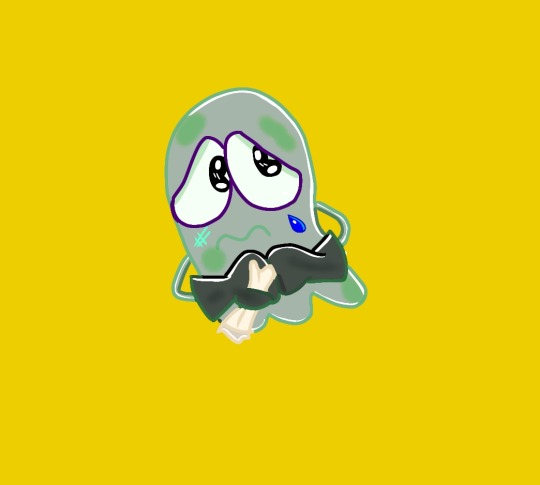
Nobody loves a ghost!
17 notes
·
View notes
Text
So right now I'm working on the outline for a story I have to write, and I'm realizing that so far, every story I've written has a sympathetic villain in it that turns to the protagonists side in the end. I don't know what that says about me.
2 notes
·
View notes
Text
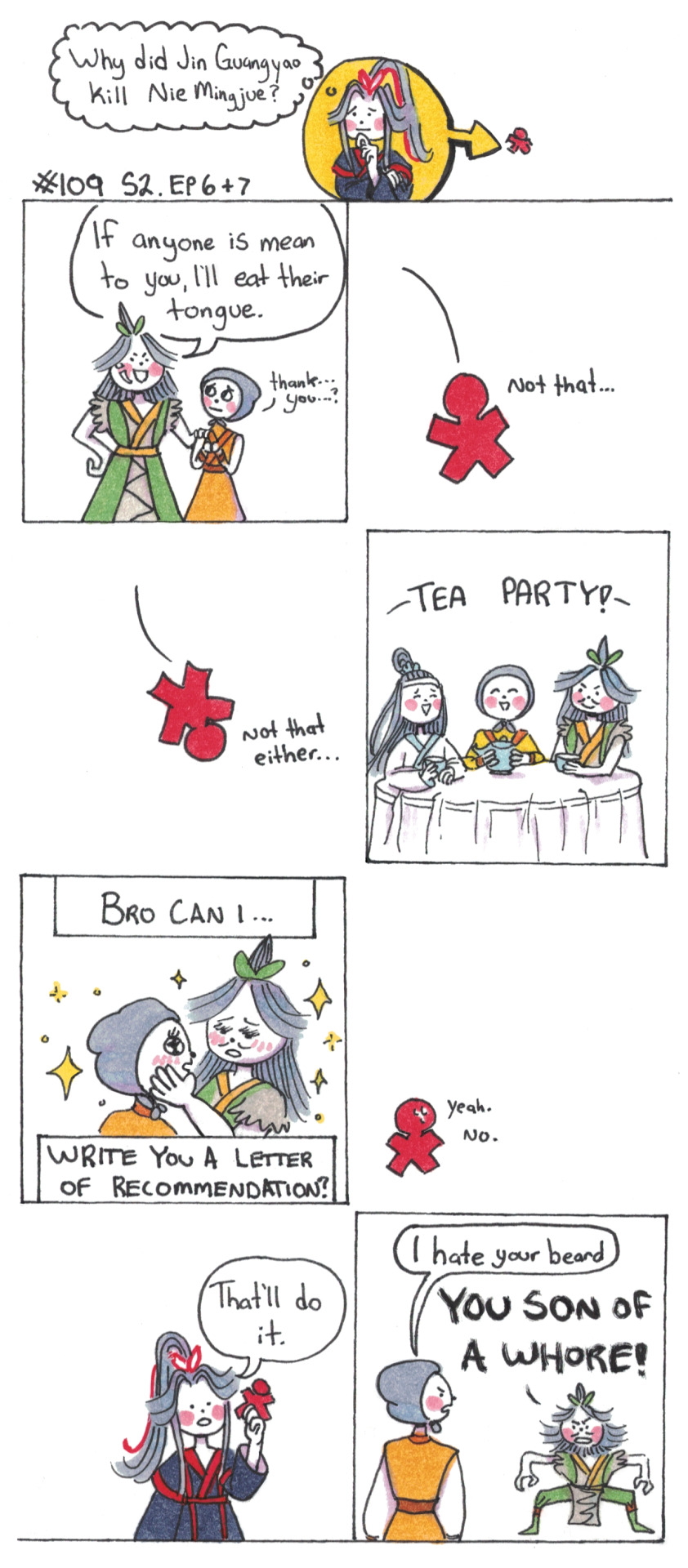
We could have had it all...
[First] Prev <–-> Next
#poorly drawn mdzs#mdzs#wei wuxian#jin guangyao#nie mingjue#oh man....the NieYao dynamic....All these complex emotions and ties to each other and they *aren't* canon?#Sorry fellas but the way you proposed writing your bro a letter of recommendation & agreeing to it was very fruity.#And *then* Lan Xichen shows up. And both JGY and NMJ are head over heels for him and have been for ages apparently.#Its like they found out that LXC had been two timing them this whole time and their response was: “UM. HOT?”#I'm tempted to redraw these three as that one bisexual-core image with Anne Hathaway. You know the one. It fits.#It's strange seeing all of this fondness in retrospect compared to the betrayal you feel in The Untamed after a longer build up.#Initially it felt like 'oops we made him a little too 2 dimensional as a villain - quick make him more sympathetic'.#JGY even had a scene with him kissing babies. As any politician would do to improve their image.#but it does come around to really showing a more authentic JGY and the tension between him and NMJ.#As an angst lover I am personally all for 'what could have been' relationships and they DO have it all.
948 notes
·
View notes
Text

I think y'all are sleeping on this.
"you seek gortash? His soul is already suffering at my hands. This is the fate of all those who fail me"
If you use speak with the dead in gortash after you kill him, he's not there, he's already been taken by Bane to be tortured forever. I won't spoil what Bane says after this but can we all agree how fucked up it is that Tav is ringing gortash' spirit phone and Bane picks up like "yeah he's busy being in agony, can I take a message?" And then presumably goes back to torturing him for all eternity and NO ONE says anything???
I'm gonna try it on orin too, presumably she's suffering something similar. They both needed to die but I don't think forever torture is an appropriate punishment for both of them. Orin is definitely worse than gortash, both in terms of danger level and sheer body count.
#enver gortash#bg3 gortash#gortash#maybe im just too sympathetic to assholes with tragic back stories#well played larion#once more making me care about villains and feeling bad killing them
749 notes
·
View notes
Text
Dear fic writers:
You can make the villain sympathetic without demonizing the hero.
You can make the villain sympathetic without demonizing the hero.
You can make the villain sympathetic without demonizing the hero.
It’s a stupid trope, and it needs to die.
That is all.
#*cough cough* Maleficent *cough cough*#Stefan did not deserve what they did to him.#Also practically every Peter Pan retelling that tries to be all dark and edgy.#I love Hook but Peter is not evil.#stop it people#just stop#it’s lazy writing and it’s been some way too many times now#fanfiction#fanfiction writer#retellings#fairytale retelling#sympathetic villains#poor writing
43 notes
·
View notes
Text
"Oohh your favorite character did horrible things so what if they had a sad past why should you feel bad for them"
That's why I consider them SYMPATHETIC VILLAINS Susan
0 notes
Text
the plot of inquisition is fairly basic/unoriginal imo UNTIL you factor trespasser in as the real ending. that elevates the story so far beyond a simple fantasy "bad monster guy wants to take over the world. the plucky hero and his friends stops him" to something much more compelling. the moment you find out corypheus was really just small potatoes and you should have been worrying about the unassuming, soft-spoken elf who you thought was your friend and would always be by your side.... unparalleled. of course trespasser shouldn't have been a dlc I mean... we shouldn't have had to pay extra for something which is absolutely critical to the story of inquisition, but anyway...... it's truly the plot twist of all time. corypheus was a bit blah as a bad guy but really he was just a distraction- all you've been doing this whole time is cleaning up solas's mess so he can freely carry out his plans. solas is already an incredibly good villain, just being able to see and get to know the "human" side of him for an entire game is amazing set-up for da:d
#dragon age#dragon age inquisition#meredith was also a great villain. bc she was on some level sympathetic and complex#she had motivations beyond Being Evil even if they became warped into something extreme#(i don't mean we should feel sorry for her. i mean she was written as human)#patrick weekes being lead writer when he wrote trespasser Bodes Well imo#solas#dragon age talks
259 notes
·
View notes
Text
I think the key component to my personal reading of post-Delphi Pharma is that he's trying to be a horrible person on purpose. Not "on purpose" in the way that people have free will to exercise their own choices, but in that Pharma's "mad doctor" persona is a performance he puts on to deliberately embrace how much everyone else hates him. Basically, if people already think you're a "bad Autobot" and a horrible doctor who just kills his patients for fun, why try to prove otherwise to people who have already made up their minds about you? Just fully embrace the fact that people see you as an asshole. Don't try to change their minds. Don't plead for their forgiveness or understanding. Just stop caring. If you're going to be remembered as a monster, you might as well be a memorable monster, and eke as much pleasure and hedonism as you can out of it before karma catches up to you and you inevitably crash and burn.
I mean, I guess you could just go the route of "Oh, Pharma was always a fucked up creepy guy and Delphi was just him taking the mask off," but I really don't like that interpretation because, for one, it feels really wrong to take a character like Pharma becoming evil under duress and going, "Oh well clearly he did the things he did because he was evil all along," as if somehow Pharma breaking under blackmail/torture/threat of horrible death was a sign of him having poor moral character. As opposed to, you know, suffering under the very real threat of horrible death for himself and everyone he cares about while being manipulated by a guy who specializes in psychological torture.
The second reason is that it just doesn't make sense to write Pharma as having been evil all along. I mean...

Occam's Razor says that the best argument is the one with the simplest explanation. Doesn't it make way more sense to take Pharma's appearances in flashbacks, his friendship with Ratchet, his stunning medical accomplishments, and the few we see of him speaking kindly/sympathetically (or in the least charitable interpretation, at least professionally) towards his patients and conclude "This guy was just a normal person, if exceptionally talented." Taking all of these flashback appearances at face value and assuming Pharma was being genuine/honest is a way simpler and more logical explanation than trying to argue that Pharma for the past 4 million years was just faking being a good doctor/person. I mean, it's possible within the realm of headcanon, but the fact is Pharma's appearances in the story are so brief that there simply wasn't room in the story for there to be some sort of secret conspiracy/hidden manipulation behind why Pharma acted the way he did in the past.
I just can't help but look at things like Pharma's friendship with Ratchet (himself a good person and usually a fine judge of character) and the fact that even post-Delphi, pretty much every single mention of Pharma comes with some mention of "He was a good doctor for most of his life" or "He was making major headways in research [before he started killing patients]" which implies that even the Autobots themselves see Pharma's villainy as a recent turn in his life compared to how for "most of his life" he "used to be" a good doctor.
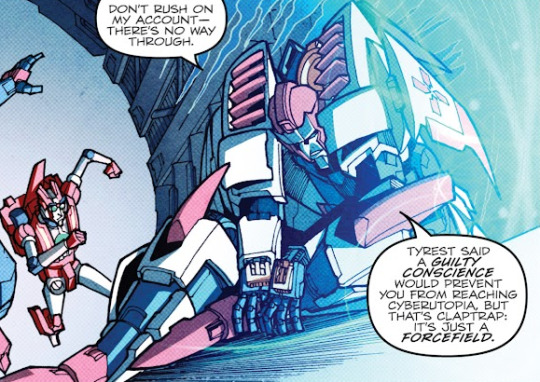
And although Pharma doesn't know this, we as the readers (and even other characters like Rung) know about Aequitas technology and the fact that it actually works, so... if Pharma really was an unrepentant murderer, why couldn't he get through the forcefield too? The Aequitas forcefield doesn't require that a person be completely morally pure and free of wrongdoing or else how could Tyrest get through, just that they feel a sense of inner peace and lack feelings of guilt. Pharma has murdered and tortured people by this point, and put on quite a campy and theatrical show of how much he sees it as a fun game, so why then can he not get through?
It circles back to my headcanon at the start of this post that the "mad doctor" persona is just that-- a persona. Delphi/post-Delphi Pharma's laughing madman personality is just so far removed from every flashback we saw of him and everything we can infer based on how other people see/saw him before that, to me, the mad doctor act is (at least in large part, if not fully) a persona that Pharma puts on to put his villainy in the forefront.
To avoid an overly simplistic/ableist take, I don't think Tarn tortured Pharma into turning crazy. To me, it's more like the constant pressure of death by horrific torture, the feeling of martyrdom as Pharma kept secret that he was the only one standing between Delphi and annihilation, the physical isolation of Messatine as well as the emotional separation from Ratchet, being forced to violate his medical oaths (pretty much the only thing Pharma's entire life has been about), etc. All of that combined traumatized Pharma to the point that the only way he could avoid cracking was to just stop caring about all of it. Because at least then, even if he's still murdering patients to save Delphi from a group of sadistic freaks, Pharma doesn't have to feel guilty and sick about doing it. As opposed to the alternatives, which were probably either going off the deep end and killing himself to escape, or confessing to what he did and getting jailed for it.
In that light, Pharma becoming a mad doctor makes sense. It avoids the bad writing tropes of "oh this character who was good his entire life was actually just evil and really good at hiding it" as well as "oh he got tortured and went crazy that's why he's so random and silly and killing people, he's crazy" and instead frames Pharma's evil as something he was forced into, to the point where in order to avoid a full psychological breakdown and keep defending Delphi, he just had to stop caring about the sanctity of life or about what other people might think of him.
Then, of course, the actual Delphi episode happens, and Pharma's own lifelong best friend Ratchet basically spits in his face and sees him as nothing more than a crazy murderer who went rogue from being a good Autobot. Then Pharma gets his hands cut off and left to die on Messatine. At that point, Pharma has not only been mentally/emotionally broken into losing his feelings of compassion, he's received the message loud and clear: He is alone. Everyone hates him. Not even his own best friend likes him any more. No one even cared enough about him to check if he actually died or not. He will only ever be remembered as a doctor who went insane and killed his patients.
So in the light of 1. Having all of your redeeming qualities be squeezed out of you one by one for the sake of survival and 2. Having your reputation and all of your positive relationships be destroyed and 3. People only know/care about you as "that doctor who became evil and killed his patients" rather than the millions of years of good service that came before.
What else is there to do but internalize the fact that you'll forever be seen as a monster and a freak, and embrace it? People already see you as a murderer for that blackmail deal you did, so why not become an actual murderer and just start killing people on a whim? People already see you as an irredeemable monster who puts a stain on the Autobot name, so why beg for their forgiveness when you could just shun them back? You've already become a murderer, a traitor, and a horrible doctor, so what's a few more evil acts added to the pile? It's not like anyone will ever forgive you or love you ever again.
Why care? Why try to hold on to your principles of compassion, kindness, medical ethics, when an entire lifetime of being a good person did nothing to save you from blackmail and then abandonment? Why put yourself through the emotional agony of feeling lonely, guilty, miserable, when you could just... stop caring, and not hurt any more?
#squiggposting#pharma apologism#i'm sure the doylist reason for the writing is just that pharma was a designated villain#so since he's a villain and 'crazy' it's fine for everyone even the good guys to treat him like complete trash#i just think from a watsonian perspective taking a sympathetic approach is way more interesting and logically consistent#what i mean is like. from a meta perspective one of the best ways to show that a character is super evil and not worth saving#is when even the good guy heroes. the ones who are supposed to be kind and compassionate and wise. see him as dirt#and this is also kind of a necessity in most plots bc TF is the kind of series that just needs action villains and long-term antagonists#so not every villain is written or has a plot to be made redeemable. and pharma is one of these bc he's not important or a legacy character#so from a doylist (meta) perspective you could read the autobots' disregard of pharma as a sign of#'this guy is not meant to have your sympathy as a reader. pay no attention to him'#but from a watsonian (in universe) perspective it paints a miserable picture of pharma being utterly forsaken by the ppl he served alongsid#and like yeah i'm super autistic about pharma so of course i view him with sympathy but like#the idea of being a loyal and good person for years only to be subjected to a Torment Nexus of#being blackmailed into breaking all of the oaths you held sacred. under threat of you and all your comrades dying horrible torturous deaths#then when your comrades find out about it they focus solely on the 'harvesting organs' and not on the 'blackmail' part#and then you get literally left for dead by your comrades and best friend hating your guts#and then you get rescued by a guy who uses you as a test subject for his evil machine#this is a fucking nightmare scenario like pharma could hardly be suffering more if the author TRIED to make him suffer#and for me it's like. the evil pharma did can't be decontextualized to what drove him to that. as well as the question of like#how easily ppl can write someone off as evil and turn a blind eye to (or even find satisfaction in) their suffering bc theyre evil#and either brought it on themselves or it's just karma paying a visit#like. i feel like if pharma WERE a shitty doctor and a terrible person his whole life then the delphi situation would feel like karma#but the way it's written and the lore retroactively put in makes it feel more pharma getting thrown in a torture carousel#and THEN becoming evil. but then being treated as if he was always evil or was some sort of bad apple#bc like i'm not opposed to LOLing when a villain gets a karmic torture/death related to the wrongs they committed#but in pharma's case it feels less like karma and more like endless torture + being abandoned by ppl who should have been more loyal
278 notes
·
View notes